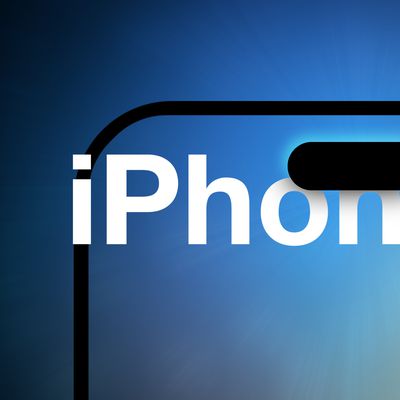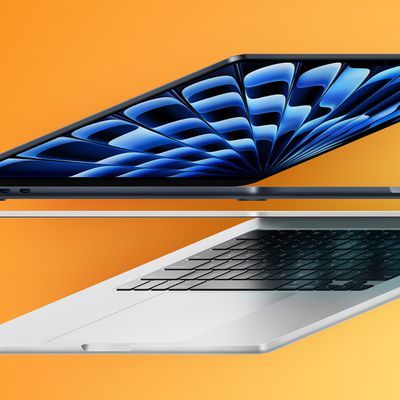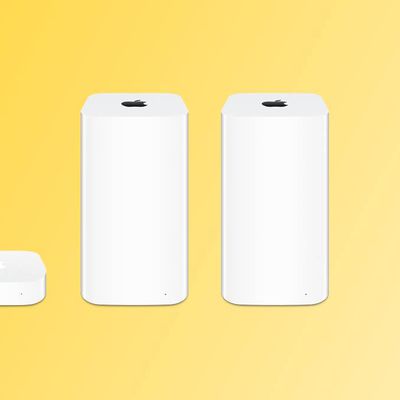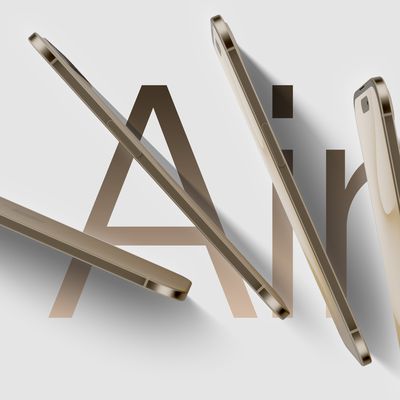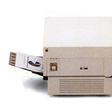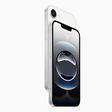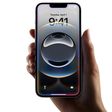Intel Launches New Broadwell Chips Appropriate for MacBook Air and 13-Inch MacBook Pro
Intel today announced the launch of a full set of "Broadwell-U" processors, opening the door for updated versions of Apple's MacBook Air and 13-inch Retina MacBook Pro. The chip launch is essentially in line with a leaked timeline from last July that also pegs the release of more powerful Broadwell chips appropriate for the 15-inch Retina MacBook Pro as late as July or August of this year.
As outlined by AnandTech, the new Broadwell-U chips include a set of four 28-watt chips ranging from 2.5 GHz to 3.1 GHz in base frequency and featuring new Iris 6100 integrated graphics. The Core i5-5257U, Core i5-5287U, and Core i7-5557U chips appear to allow for direct upgrades from the Haswell-U chips currently used in the 13-inch Retina MacBook Pro. While the new chips include only a 100 MHz CPU speed increase over their Haswell counterparts, a number of other improvements, especially with regard to graphics, should make for significantly improved performance.
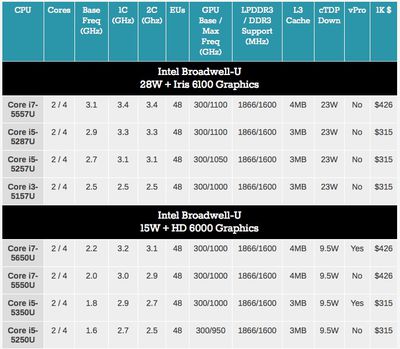
Broadwell-U chips appropriate for 13-inch Retina MacBook Pro (top) and MacBook Air (bottom)
(Source: AnandTech)
On the MacBook Air front, Intel is offering four different 15-watt Broadwell-U chips that would be appropriate for the lineup, with all of the new chips carrying improved HD 6000 graphics. Base clock speeds range from 1.6 GHz to 2.2 GHz compared to the 1.4 GHz and 1.7 GHz options available in the current MacBook Air, and associated upgrades in Broadwell should yield significant performance improvements for the new chips.
Looking at potential release dates for Apple's Broadwell systems, Intel tells AnandTech that the new Broadwell-U chips are already shipping to vendors, with the first systems based on the new chips expected by the end of the month. Systems based on chips using Iris graphics may be more toward the end of the current quarter.
Popular Stories
iOS 19 is still around three months away from being unveiled, but there are plenty of rumors about the upcoming update.
Below, we recap iOS 19 rumors so far.
Redesigned Camera App
A leak earlier this year allegedly revealed a redesigned Camera app coming with iOS 19.
On his YouTube channel Front Page Tech in January, Jon Prosser shared a video showing what the new Camera app will...
iOS 18.4 was supposed to bring new Apple Intelligence Siri features, but Apple ended up needing to pull those capabilities from the update to continue testing. There are fewer new Apple Intelligence additions now, but there are still some new features that will make the update worth installing when it comes out in April.
Priority Notifications
Apple introduced Priority Notifications back at ...
In a recent press release, Apple confirmed that iOS 18.4 will be released in April.
From the Apple News+ Food announcement:Coming with iOS 18.4 and iPadOS 18.4 in April, Apple News+ subscribers will have access to Apple News+ Food, a new section that will feature tens of thousands of recipes — as well as stories about restaurants, healthy eating, kitchen essentials, and more — from the...
Apple is expected to embrace a new camera system design for some models in its upcoming iPhone 17 series, and the latest purported CAD images don't deviate from what we have been hearing lately about Apple's new lineup. If you do not like the sound of an iPhone with a Google Pixel-style camera bar, look away now.
Seasoned leaker Sonny Dickson shared the following images in a post on X...
With the iPhone 16e now in the hands of customers, Apple reportedly plans to move on to its next product announcement in the coming days.
Apple plans to announce new MacBook Air models with the M4 chip "as early as this week," according to Bloomberg's Mark Gurman.
"I expect the M4 MacBook Air to be introduced as early as this week," said Gurman, in a post shared on X today. "Inventory has ...
Throughout the 2000s and 2010s, Apple offered a line of Wi-Fi routers that it referred to as AirPort base stations. There was a standard AirPort Express, a higher-end AirPort Extreme with more advanced networking features, and an AirPort Time Capsule that doubled as an external storage drive for backing up a Mac with Time Machine.
Apple discontinued the AirPort line in 2018, but the company...
Apple is expected to announce new MacBook Air models with the M4 chip as soon as this week, and new iPads should follow shortly after.
iPad Air and iPad 10 inventory is running low at Apple Stores, and Bloomberg's Mark Gurman believes this is a sign that new iPads will be introduced soon.
However, unlike the new MacBook Air, he said the new iPad models "probably won't come in the next few ...
Apple CEO Tim Cook today teased a new product announcement coming "this week."
"There's something in the air," the teaser says.
This teaser likely refers to a new MacBook Air with the M4 chip, which is already expected to be announced as early as this week.
Apple used the same "there's something in the air" slogan before it announced the original MacBook Air in 2008.
Cook shared a si...
The thin and light design of Apple's rumored "iPhone 17 Air" will require some compromises. The device is rumored to lack three features found on many iPhone models, including a bottom speaker, an Ultra Wide camera, and a SIM card slot internationally.
The Information last year reported that the ultra-thin iPhone 17 model will have only a single speaker, built into the earpiece at the top of ...






